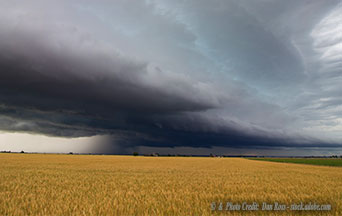A Storm Brews over the Credibility of Climate Studies
by Gary Isbell April 14, 2025 https://www.tfp.org/a-storm-brews-over-the-credibility-of-climate-studies/?PKG=TFPE3580
Objectivity gives credibility to scientific study. When scientific research is swayed by political agendas, both science and politics are compromised. Nowhere is this conflict of interest more apparent than in the realm of climate science.
For decades, climate activists have alternated between alarming scenarios of global cooling and global warming. When the weather refused to cooperate, they adopted the term climate change to encompass all possibilities.
The ever-changing field of climate science has shaped global policies, public perceptions and financial investments. However, few discuss the undisclosed conflicts of interest (COIs) that seriously undermine climate science’s credibility.
Indeed, many published climate reports and studies reveal non-governmental organizations (NGOs) funding or links to advocacy groups. Those involved in the studies generally fail to disclose crucial financial and non-financial connections.
A groundbreaking study by Jessica Weinkle et al. illustrates just how serious this problem is. An analysis of a substantial number of peer-reviewed articles examining the relationship between climate change and hurricane behavior revealed significant flaws in disclosure practices. None of the 331 authors analyzed reported any financial or non-financial conflicts of interest. This failure to report stands in stark contrast to other fields, such as biosciences, where conflict of interest disclosures range from 17 to 33 percent.
The study identified problematic affiliations among the authors, including undisclosed connections to climate risk analytics firms, financial institutions, and litigation advocacy groups. For example, one author who advised both a risk analytics firm and a financial company failed to disclose these conflicts. Such affiliations often influence the selection of research topics, methodologies, and interpretations of outcomes. This can lead to biased results that align more with the funders’ objectives than with the interests of science.
The study also expressed great concern about the effect of NGO funding. The data revealed that NGO-funded studies were significantly more likely to indicate a positive correlation between “climate change” and extreme weather events, such as hurricanes.
Such conclusions align with the strategic interests of these organizations, which often use these findings to enhance advocacy campaigns, influence policy and initiate climate litigation at taxpayers’ expense.
Other fields, such as medicine, have taken measures to prevent these issues. For example, the medical research establishment has implemented mandatory disclosures through mechanisms like the Physician Payments Sunshine Act.
However, climate science has not adopted similar measures despite its considerable influence on global policy, finance and energy decisions.
COIs do not inherently undermine the value of scientific research since many scientists produce reliable work despite these affiliations. However, disclosure is crucial for maintaining transparency, objectivity and public trust. Without full disclosure, it is hard to assess the credibility of the research or the neutrality of its conclusions.
Financial incentives, political stakes, and institutional affiliations tend to shape research outcomes. Criteria for assessing COI risks should include questions such as:
- Do sponsors or researchers hold significant financial or political interests in the study’s outcome?
- Do financial interests relate to carrying out impartial research?
- Is the study open to manipulation that might yield desired results?
Without these disclosure measures, climate science appears highly vulnerable to bias. Radical eco-activists are all too ready to capitalize on skewed studies to promote their agenda.
The absence of rigorous COI policies impacts more than academic integrity. It can distort reality and change policies and practices in many other fields.
For instance, flawed science leads to exaggerated risk assessments, inflated insurance premiums, misguided carbon taxes and unnecessary energy restrictions. Litigation driven by selective climate research, commonly called “extreme event attribution,” poses financial and reputational risks for industries and governments.
Journals, professional organizations, and funding agencies should implement mandatory COI disclosure policies to enhance credibility in climate science.
Inspired by frameworks like the International Committee of Medical Journal Editors (ICMJE), these policies should include:
- Financial Transparency: Authors must disclose all financial ties, including consulting fees, stock ownership and funding from advocacy groups.
- Non-Financial Transparency: Relationships with NGOs, litigation-related activities or political affiliations must also be disclosed.
- Centralized Databases: A centralized platform for maintaining COI disclosures across journals can reduce administrative burdens and ensure accessibility.
The study of the earth’s climate is an important field. However, it must limit itself to areas where it has competence and not stray into hidden political agendas. Embracing transparency will enhance the credibility of this research and generate realistic policies that will benefit the public.

